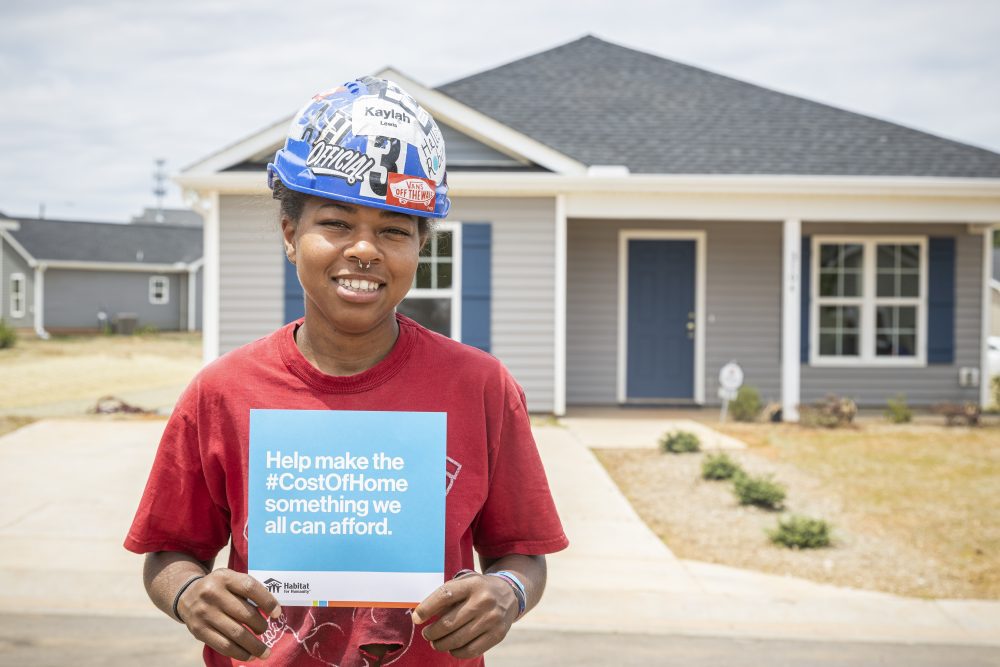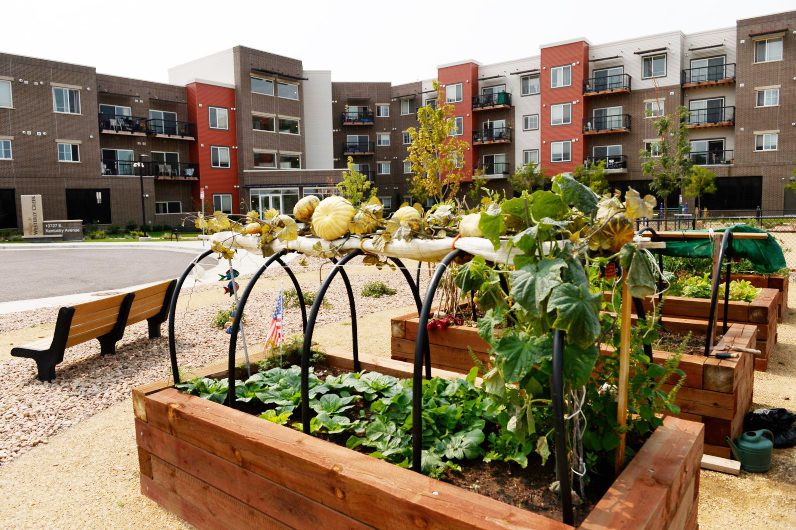
Habitat for Humanity volunteer in Raleigh, North Carolina. Photo courtesy of Habitat for Humanity International
Housing has been our calling for over 30 years. As leaders of the U.S. Department of Housing and Urban Development, serving presidents of opposing parties, our approaches may have varied, but our goals were the same: a country where everyone has a safe, decent, and affordable place to live.
Housing hasn’t often been a top issue for political candidates, but that’s about to change. Today, 19 million families—one in six—spend half or more of their income on rent or a mortgage, often forced to choose between paying for housing, nutritious food, reliable transportation, or healthcare. These families are your friends and neighbors. You know them, even though you may never know their struggle with affording their home. Nineteen million families is far too many people—and voters—for our elected leaders to ignore any longer.
Candidates for offices at all levels—whether for city council, state representative, or the White House—must put forward credible plans for advancing housing affordability in our communities. But they’re not going to do it unless we, the voting public, raise our voices and compel them to. That’s why we are proud to support a new campaign focusing on home affordability that Habitat for Humanity is launching this week: Cost of Home. Through its decades of on-the-ground experience, public policy expertise, and history of engaging diverse coalitions and stakeholders, Habitat for Humanity is uniquely positioned to take on this issue from a seasoned perspective, and in the spirit of bipartisanship.
Why this campaign, and why now? Frankly, we’ve reached a tipping point when it comes to home affordability in the United States. According to the annual State of the Nation’s Housing Report from Harvard’s Joint Center for Housing Studies, over 38 million households can’t afford their housing. In fact, there is virtually nowhere in the U.S. where a full-time employee earning minimum wage can afford a one-bedroom apartment. Even two such jobs couldn’t cover rent for a two-bedroom apartment in 34 states and the District of Columbia.
We know the impact of living in a cost-burdened household can have long-lasting effects on children. Cost-burdened families spend on average $190 less on food and 70 percent less on healthcare when compared with similar households living in affordable homes. Living in unsafe or unsanitary homes is related to greater emotional and behavioral problems among children and adolescents, and poor housing quality is also related to poorer school performance for older children.
We won’t reach our vision of a world where everyone has a decent place to live without addressing the underlying policies and systems that hinder access to housing. To improve housing affordability broadly, policymakers need to support comprehensive packages that address the increasing cost of housing across the entire housing spectrum—rental and homeownership—to meet the needs of families nationwide. We can start working on these policies by listening to our neighbors and understanding their struggles.
Federal investments in affordable housing are failing to keep up with local needs, but to supplement static or declining federal housing resources we’re seeing local and state funds raise significant resources of their own.
For example, in Minnesota, Twin Cities Habitat for Humanity worked in coalition with other affordable housing organizations throughout the city to advocate for substantial increases to the Minneapolis Affordable Housing Trust Fund (AHTF) which provides gap funding to finance the development of affordable and mixed-income rental housing, housing production, and preservation projects in the city.
The mayor of Minneapolis heard this coalition’s concerns and signed a 2019 city budget that included record funding for affordable housing, nearly double what it had spent in 2018. Now, Minneapolis’s Affordable Housing Trust Fund will support the production of between 500 and 800 units of affordable housing. This housing will give a family safety, security, and most importantly, a place to call home.
This is the kind of success we hope to see across the country. The Cost of Home campaign is designed to bring together politicians, community groups, and affordable housing advocates to find and implement solutions that will address housing challenges and improve policies in communities across the nation. There is no silver bullet to solving home affordability and solutions need to be driven locally, but there is no doubt policy change is needed in four key areas, including: increasing the supply of affordable homes, optimizing land use for affordable housing, equitably increasing access to credit, and ensuring access to communities of opportunity.
We can no longer ignore the issue of affordable housing because it is complicated or because it might force us to have uncomfortable conversations. To borrow a famous line from President Kennedy: we must take on this challenge precisely because it is hard, because the cost of continuing to do nothing is too great.
When the cost of home is any family’s future, that’s something none of us can afford. The Cost of Home campaign offers a bold model of national action and policy solutions that can help millions of people across the United States access affordable homes. By coming together to support this effort, we can ensure access to safe, decent housing for everyone.






I applaud the authors for drawing our attention to the important topic of affordable housing.
A few communities have made progress in this regard by reducing the property tax rate applied to privately-created building values while increasing the tax rate applied to publicly-created land values. The lower rate applied to buildings makes them cheaper to construct, improve and maintain. Surprisingly, the higher rate applied to land value helps keep land more affordable as well. This reform, land value return and recycling, can make both buildings and land more affordable throughout a community without any increase in spending or any loss of revenue. See “The Jobs-Housing Hamster Wheel” at https://shelterforce.org/2018/08/20/the-jobs-housing-hamster-wheel/